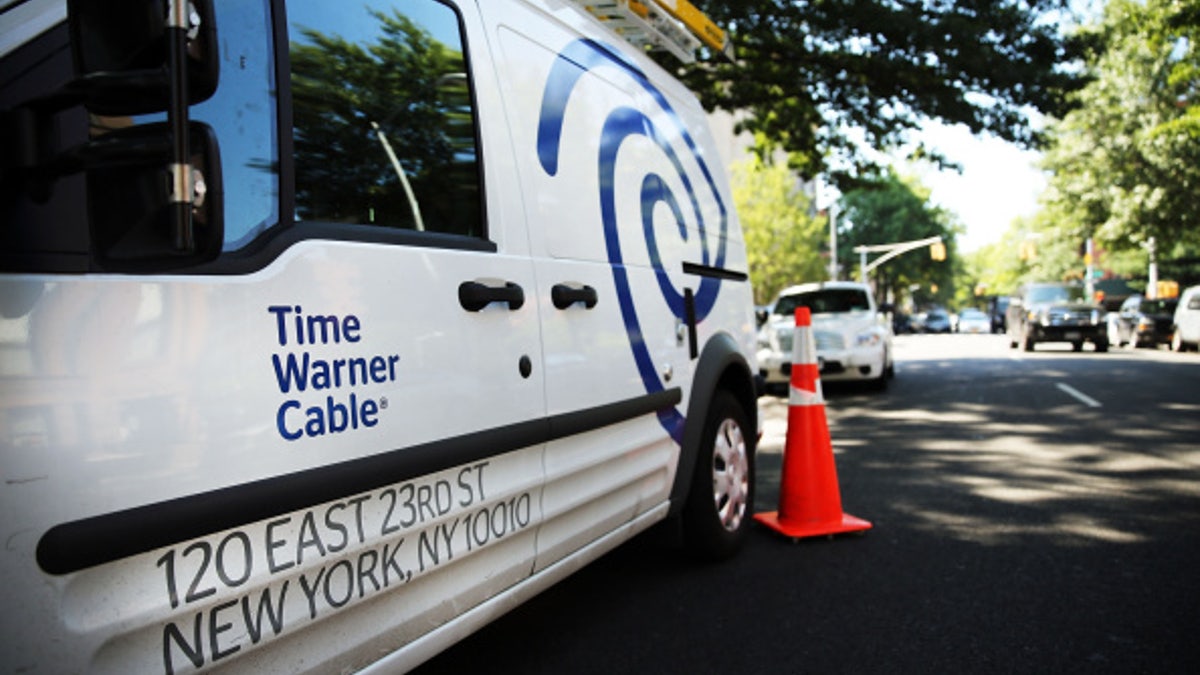
NEW YORK, NY - AUGUST 27: A Time Warner Cable truck is viewed in Brooklyn on August 27, 2014 in New York City. Time Warner Cable, which has 11.4 million subscribers in the United States, suffered a massive power outage Wednesday morning across the nation. While customers appeared to have power back by mid-morning, thousands had lost internet service for the duration of the outage. In a deal that is valued at $45.2 billion, Time Warner Cable is attempting to merge with Comcast. (Photo by Spencer Platt/Getty Images) (2014 Getty Images)
Since the proposed Comcast and Time Warner Cable merger was announced over a year ago, the transaction has ignited the passions and interests of a wide variety of individuals and groups. Obviously, a deal of such magnitude has many different components that an engaged citizenry should discuss openly and constructively.
But what was originally a business deal unfortunately has morphed into a rallying point for self-proclaimed social justice activists. They paint a dystopian scenario where a company like Comcast controls what we see and who has access to the benefits of modern telecommunication services. In their narratives, the most vulnerable minority members of our society are stripped of access to broadband and its benefits.
It does not take a huge stretch of the imagination to estimate that Comcast will rely on Latino workers as it upgrades Time Warner Cable’s current infrastructure. In so doing, Comcast will directly invest in the success and continued improvement of our community—another point conveniently ignored by the aforementioned activists.
Perhaps the best examples are radical organizations like Free Press and presente.org, the latter of which fancies itself as a Latino-focused Move On. Free Press is out to attack the very notion of for-profit media companies, while presente.org is less forthcoming about a whole list of goals, choosing only to launch unsubstantiated accusations and falsehoods in their propaganda.
Presente.org founder Arturo Carmona goes so far as to paint the merger as “a major assault on the Latino community.” He claims to have the interest of low-income communities at heart, “for whom this merger could mean an actual barrier to accessing the Internet.” Carmona’s group has gone so far as to encourage individuals to contact the California Public Utilities Commission in an attempt to stop the merger, issuing a vacuous missive predicting certain doom if the merger does end up taking place.
Beyond the rhetoric, observers should understand the reality of the problem of what experts call the “Digital Divide.”
- A look at how police patrol, and people live in, a country torn apart by gang wars
- Cuba lowers prices to Internet access: now an hour costs 10% of monthly salary
- Apple On Verge Of Buying Beats By Dre For $3.2 Billion, Report Says
- Robot Submarines May Be Next Step In Search For Malaysian Jetliner
- Eva Longoria says networks are ‘scared’ about programming Latino shows
A Federal Communications Commission report claims that 19 million Americans currently lack access to broadband service—roughly six percent of the population. Only 63 percent of the Hispanic population has access to broadband at home. The chief reason for this is cost. One report ranks the U.S. 30th out of 33 countries in terms of broadband affordability, with an average monthly cost of $44. These dynamics has an adverse affect on economic opportunity, especially with education and employment services becoming an increasingly digital experience.
There is probably room for most companies in America to improve their Latino inclusion efforts. But, like them or not, Comcast has a historically proven track record of minority inclusion and community investment, especially with regards to Latinos. One benefit of the pending merger will be to make Comcast’s Internet Essentials program available to low-income families currently in Time Warner Cable’s telecommunication footprint.
The Internet Essentials program provides broadband service to lower income families for $9.95 a month. Comcast recently announced it added 1.8 million Americans to its program. This success is especially noteworthy in comparison to similar programs from other telecom companies. Put in perspective, Internet Essentials accounts for a quarter of all national broadband adoption growth for low-income families since the program’s inception. Internet Essentials is a real and quantifiable effort that strikes right at the heart of the Digital Divide.
In addition, there is the issue of infrastructure development. Comcast has signaled its intent to expand in, New York City and Los Angeles, two cities with substantially large Latino workforce. Although I do not have access to their business plan, it does not take a huge stretch of the imagination to estimate that Comcast will rely on Latino workers as it upgrades Time Warner Cable’s current infrastructure. In so doing, Comcast will directly invest in the success and continued improvement of our community—another point conveniently ignored by the aforementioned activists.
Without this merger, nothing about the digital Divide will change. In fact the situation might grow even grimmer. The truth is, Time Warner Cable is a company that wants to be bought out. The failed merger with Charter Communications and their current state as a company suggests an eventual buyout is inevitable.
When one examines the facts and looks beyond media activists who do nothing but throw dirt around in an effort to foment a radical agenda, one can see substantive reasons that are hard to ignore. As mentioned earlier, mergers of this scale are complex, but if the exaggerated cries of catastrophe are the best that opponents can muster, perhaps it speaks to the lack of substantive arguments on their side.








































